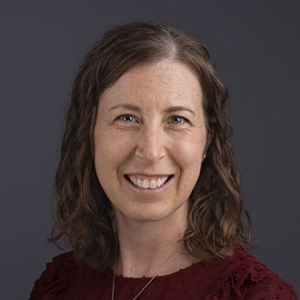In planning for the Templeton Institute for Engineering and Computer Science, Jennifer Currey wants to hear from everyone, not just the engineers and computer scientists.
As interim director of the Institute, Currey is leading the planning and implementation for a program that will do more than strengthen engineering and computer science.
It will further integrate those disciplines across the entire campus.
“One of the main goals is to get everyone at the table to talk about why this would be good for them,” said the associate professor of electrical, computer and biomedical engineering. “As a committee and a campus we have to step back and ask what we want our students to get out of engineering.”
The Institute is made possible by a gift of $51 million from 1980 graduates Rich and Mary Templeton. Besides the Templeton Institute, the gift will support the recruitment and retention of women pursuing a degree in engineering or computer science, enhancements to the curriculum, faculty support and further development of facilities. The gift was announced Feb. 21, 2020 at the launch of the "Powering Union" fundraising campaign. For more visit here.
Recruiting women
The recruitment and retention of women faculty and students is a priority. For Currey, that begins with the person at the front of the room. “We need to make sure that the diversity we’re seeking is reflected back to the students through the faculty who are in the classroom with them,” she said. “As a woman engineer, I’m able to share my perspective on issues I’ve seen in this field.” Equally important, she adds, is getting the message to men.
Recruiting women also means offering attractive programs, Currey said. Biomedical engineering, for example, is one of the division’s most popular programs with women.
Finally, it means mentoring both in college and before. Currey cites the expansion of a mentoring program for women in mechanical engineering and EDGE, an outreach program aimed at steering high school girls toward engineering.
Liberal arts and engineering
Also of particular interest to Currey is finding ways to bring students from the liberal arts into engineering.
“We won’t be successful by sticking an English major in a mechanical engineering class,” she said. Rather, success may come in the form of team learning experiences like the ones students have had in the new on-line Minerva courses. Those courses team groups of various majors to consider complex issues like climate change or social justice.
“Graduates are going to work with a diverse group of people in industry, graduate school or wherever they go,” she said. “Having an appreciation for the way people approach problems is important. There are similarities between disciplines as well as some really cool differences.”
The challenge, Currey said, is finding ways to build teams that represent a range of disciplines. In a capstone design team, for example, an engineer could cover the technical side. An economics major could do a cost analysis. A visual arts major could contribute to the aesthetic. An English major could handle marketing and communications.
Currey is perhaps most excited about the possibilities the Templeton Institute offers for faculty to “get across campus.”
“I think this is going to be really exciting for those faculty who want to engage with the liberal arts,” she said. “We came to Union for a reason. There are plenty of technical schools where we could teach. But there are not many Unions. We came because we’re passionate about the liberal arts, a sentiment I share with many of my colleagues.”
Currey, who joined the faculty in 2007, has served as director of Biomedical Engineering and as the Division IV chair on the Faculty Executive Committee. She also served as a faculty representative on an ad hoc advisory committee for engineering and computer science, co-chaired by Rich Templeton ’80 and Dean of Faculty Strom Thacker. Her research focuses on bone health and exercise. She earned her B.S., M.S. and Ph.D. at Rensselaer Polytechnic Institute.

